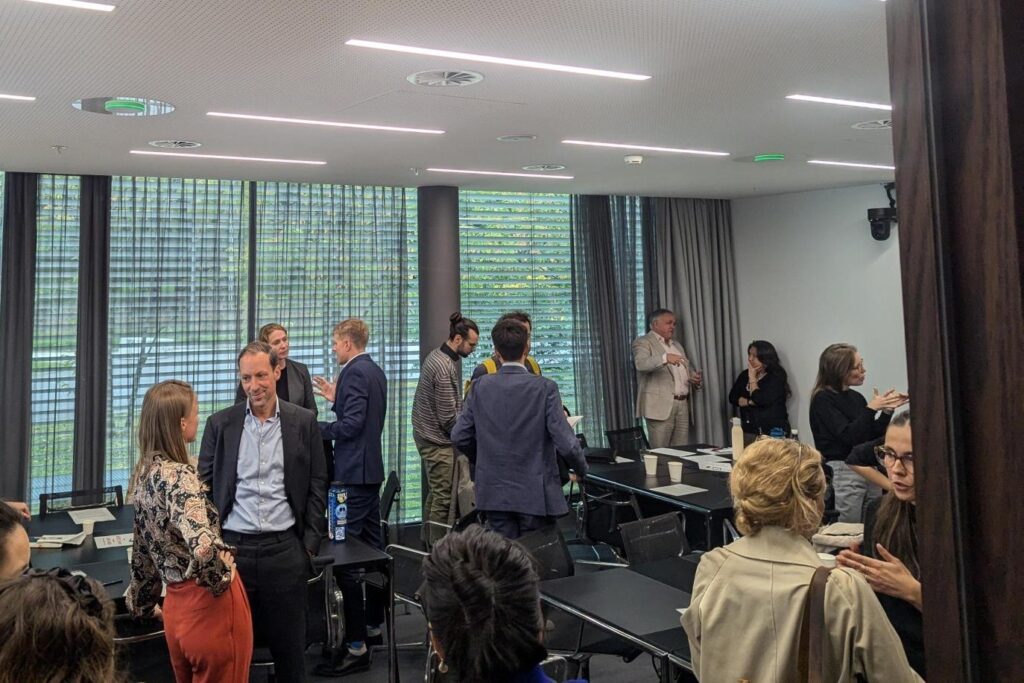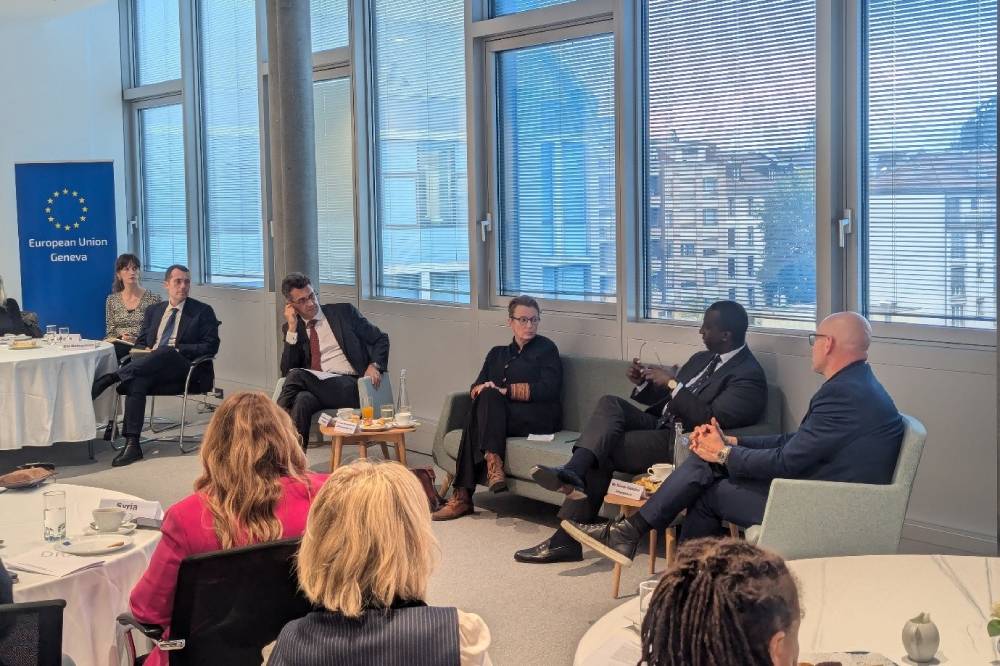During Geneva Peace Week 2025, UNIDIR convened two events that explored the future of peacebuilding and the role of data in shaping effective, inclusive post-conflict transitions. Together, they highlighted a central message: In an era of geopolitical volatility, technological disruption, and eroding multilateralism, peace will depend on both visionary leadership and evidence-driven action.
On 16 October, leading practitioners, academics and diplomats gathered at the Delegation of the European Union in Geneva for a high-level salon on building peace for an uncertain future. Organized by UNIDIR’s Managing Exits from Armed Conflict Project, in partnership with Interpeace and the European Union, the event provided a space to generate innovative strategies for addressing today’s complex threats to peace.
The discussion was framed by a sobering reality: International governance is under strain. Legal norms are eroding, States are shifting their focus towards narrow national interests and transactional power brokering, rather than promoting collective action for sustainable peacebuilding. Conflicts are becoming more protracted and multifaceted, shaped by the proliferation of armed Non-State actors, blurred lines between civilians and combatants, the rise of private military companies, and the spread of destructive technologies. Traditional peacebuilding tools, participants noted, are often ill-suited to address these interconnected crises, and despite multilateral pledges to strengthen peaceful dispute resolution, there remains a lack of strategic vision, political will, and investment.
Leadership, innovation and inclusion in peacebuilding
The salon opened with a fireside chat moderated by UNIDIR Director Dr Robin Geiss, featuring two distinguished voices in the field: Dr Almut Wieland-Karimi, former Executive Director of the Center for International Peace Operations (ZIF) and current board member of the UN Peacebuilding Fund; and Itonde Kakoma, President of Interpeace, an NGO which works on violence prevention and peacebuilding through non-violent, non-coercive ways across multiple contexts in Africa, South America, Europe and Asia.
Following this exchange, participants engaged in an informal salon designed to encourage open dialogue. The conversation underscored the urgency of rethinking peacebuilding strategies while also pointing to opportunities for innovation and efficiency. Participants highlighted the importance of linking decision-makers with technical knowledge from the field, as well as closing the gap between high-level mediation and local stakeholders who are already negotiating access and local peace deals with armed actors.
This entails working with local and non-traditional partners, investing in preventive diplomacy, and harnessing technology for peace rather than conflict. The need to balance realist approaches to mediation with the pursuit of universal values will be key to finding ways to build peace today. To find balance, one participant noted, it is necessary to develop nuanced and broad perspectives of conflict environments, rather than dichotomous reductions of evil and good.
The discussion featured calls for more public engagement and calculated risk taking. Courageous and visionary leadership is needed not only to mediate agreements to end fighting, but to convey to the public why investing in peace – and working through the multilateral system – is essential for building (and funding) a more stable and just world for all. The closing remarks of His Excellency, Ambassador Michele Cervone d’Urso, left the participants with a positive vision of their role in the peace of tomorrow.
Harnessing data for conflict transitions
A day prior to the salon, UNIDIR partnered with IOM, UNDP and DPO to organize a workshop addressing how a data-driven approach can be applied to support the return of conflict-affected populations and ex-associates of armed groups that are reintegrating back into civilian life.
In light of the 2020 Data Strategy of the UN Secretary-General for Action by Everyone, Everywhere, the international community has increasingly committed itself to evidence-based and data-driven programming. Yet, translating these commitments into practice remains inconsistent and inadequate, particularly in insecure contexts and with hard-to-reach populations. With shifting dynamics in several contexts, the UN community may be called to provide new programming or adapt current support to return and reintegration in places like Syria, Ukraine, Haiti and other contexts in the near future.
Turning data into action
This workshop offered practitioners, academics but also interested members of the public the possibility to exchange experiences and current best practices on data collection, analysis and data-driven policy. UNIDIR and its co-hosts provided opening remarks, describing the current state of affairs and setting framing questions for each working group. Key themes identified included the need to:
- Integrate data architecture for return and reintegration programming, and the challenge of siloing data in conflict-affected contexts.
- Map existing data and the ongoing data collection efforts within and outside the United Nations to enable cooperation and coordination.
- Place returnees and communities of return at the centre of the data collection process, ensuring local relevance and producing data that is inclusive and reflects local priorities and needs.
- Balance the long-term needs of reintegration programming and cross sectoral learning (e.g., longitudinal data on reintegration journeys) with the short-term cycles of funding and reporting.
The workshop demonstrated the importance of bridging the gap between research, data as a strategic asset, and its translation into programmatic and policy impact.

A converging vision
Together, these events reflected the dual imperative of Geneva Peace Week: To generate bold ideas for peace while grounding them in practical, evidence-based tools. The workshop showcased how data can transform strategy into action, while the salon called for the leadership and collaboration necessary to turn that vision into lasting impact.
